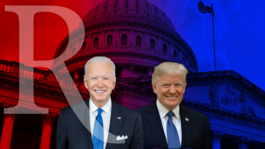Lessons for Both Parties in Virginia and New Jersey Elections
A Commentary by Michael Barone
In an August Washington Examiner column, I argued that this year's governor elections in New Jersey and Virginia would have little precedential significance, unlike some other off-year elections in those states.
Boiled down, my argument was that in New Jersey you had a governor who could not lose and in Virginia you had two governor candidates who could not win.
Now the results are in, and my predictions were not far off. Republican Chris Christie won 60 percent to 38 percent in heavily Democratic New Jersey.
In Virginia, the state closest to the national average in the last two presidential elections, neither Democrat Terry McAuliffe nor Republican Ken Cuccinelli won 50 percent of the vote. McAuliffe, far ahead in the polls for months, eked out a 48 percent to 45 percent victory.
So, these contests are of limited precedential value. But they do provide some interesting lessons for both parties.
Lesson 1 for Democrats: Obamacare hurts. Two days before Halloween, McAuliffe was leading 47 percent to 37 percent in the Real Clear Politics average of polls. In seven days, his margin melted from 10 percentage points to 2.5 points.
The big news during that period was the rocky Obamacare rollout and stories revealing that Barack Obama's repeated statements that people could keep their insurance or their doctor were either lies or (as many Democrats concede) misleading.
The exit polls showed that 46 percent of Virginia voters favor Obamacare and 52 percent oppose it. In a state Obama carried twice.
Lesson 1 for Republicans: Provocativeness hurts. Cuccinelli's positions on abortion and same-sex marriage are not much different from Christie's or Virginia Republican incumbent Bob McDonnell's. But his tone was, and he lost single women by 42 percentage points.
Lesson 2 for Democrats: Your youth vote is evaporating. McAuliffe carried 18- to 29-year-old voters by only 45 percent to 40 percent; Christie lost them by only 51 percent to 49 percent. Those were in states where Obama in 2008 carried young voters 60-39 percent and 67-31 percent. They may be discovering that Obamacare raises their health insurance premiums enormously.
Lesson 2 for Republicans: Obama can still energize some Democratic base groups. Democrats got high turnout in Virginia from blacks and young singles -- in contrast to 2009. Republicans can't count on these voters staying home.
Lesson 3 for Democrats: You're not doing so well with immigrants. Hispanic and Asian turnout in Virginia was down from 2012. Christie carried Hispanics 51-45 percent in a state where they voted 78-21 percent for Obama in 2008. Polls showed Hispanics souring on Obamacare, and Christie kept showing up in their communities for four years.
Lesson 3 for Republicans: Raise more money. Cuccinelli backers complain that the Republican National Committee kicked in only $3 million, not $9 million as in 2009.
Fair point. But why didn't the Cuccinelli campaign raise more from Tea Partiers across the nation? Why not match the dollars McAuliffe raised from Clinton connections and crony capitalists? Why not raise money rather than whine?
Lesson 4 for Democrats: You can't count on Tea Partiers to shut the government down again. The victory of establishment-oriented Bradley Byrne over a Tea Partier in Alabama's 1st Congressional District runoff election Tuesday suggests that, even in a hyper-conservative district, the impulse among Republican voters for confrontation with Democrats is waning.
Lesson 4 for Republicans: You can't count on Obamacare continuing to implode. It may well do so, but you'd better have alternatives to offer.
Lesson 5 for both parties: Facts on the ground matter -- and can change the political equation.
Ted Cruz and other Obamacare defunders argued that implementing the new health care law would get Americans hooked on subsidies and make the law unrepealable. But the subsidies seem stingy and invisible, while the website remains unusable.
Barack Obama and his administrators believed they could get away with their promise that you can keep your insurance and your doctor. But the avalanche of people who eventually found out they can't was bound to undermine this claim -- and the president's credibility.
The two parties have been closely competitive in six of the 10 congressional elections over the last 20 years. Republicans fell below competitive levels in 2006 and 2008, when they were perceived as incompetent.
Democrats fell below competitive levels in 1994 and 2010, when they seemed guilty of ideological overreach.
During the government shutdown, some Democrats hoped the Republicans would suffer from both incompetence and overreach. Now, as Obamacare founders, there seems more danger that the Democrats will.
Michael Barone, senior political analyst for The Washington Examiner (www.washingtonexaminer.com), is a resident fellow at the American Enterprise Institute, a Fox News Channel contributor and a co-author of The Almanac of American Politics.
COPYRIGHT 2013 THE WASHINGTON EXAMINER
DISTRIBUTED BY CREATORS.COM
See Other Political Commentaries.
See Other Commentaries by Michael Barone.
Views expressed in this column are those of the author, not those of Rasmussen Reports. Comments about this content should be directed to the author or syndicate.
Rasmussen Reports is a media company specializing in the collection, publication and distribution of public opinion information.
We conduct public opinion polls on a variety of topics to inform our audience on events in the news and other topics of interest. To ensure editorial control and independence, we pay for the polls ourselves and generate revenue through the sale of subscriptions, sponsorships, and advertising. Nightly polling on politics, business and lifestyle topics provides the content to update the Rasmussen Reports web site many times each day. If it's in the news, it's in our polls. Additionally, the data drives a daily update newsletter and various media outlets across the country.
Some information, including the Rasmussen Reports daily Presidential Tracking Poll and commentaries are available for free to the general public. Subscriptions are available for $4.95 a month or 34.95 a year that provide subscribers with exclusive access to more than 20 stories per week on upcoming elections, consumer confidence, and issues that affect us all. For those who are really into the numbers, Platinum Members can review demographic crosstabs and a full history of our data.
To learn more about our methodology, click here.



